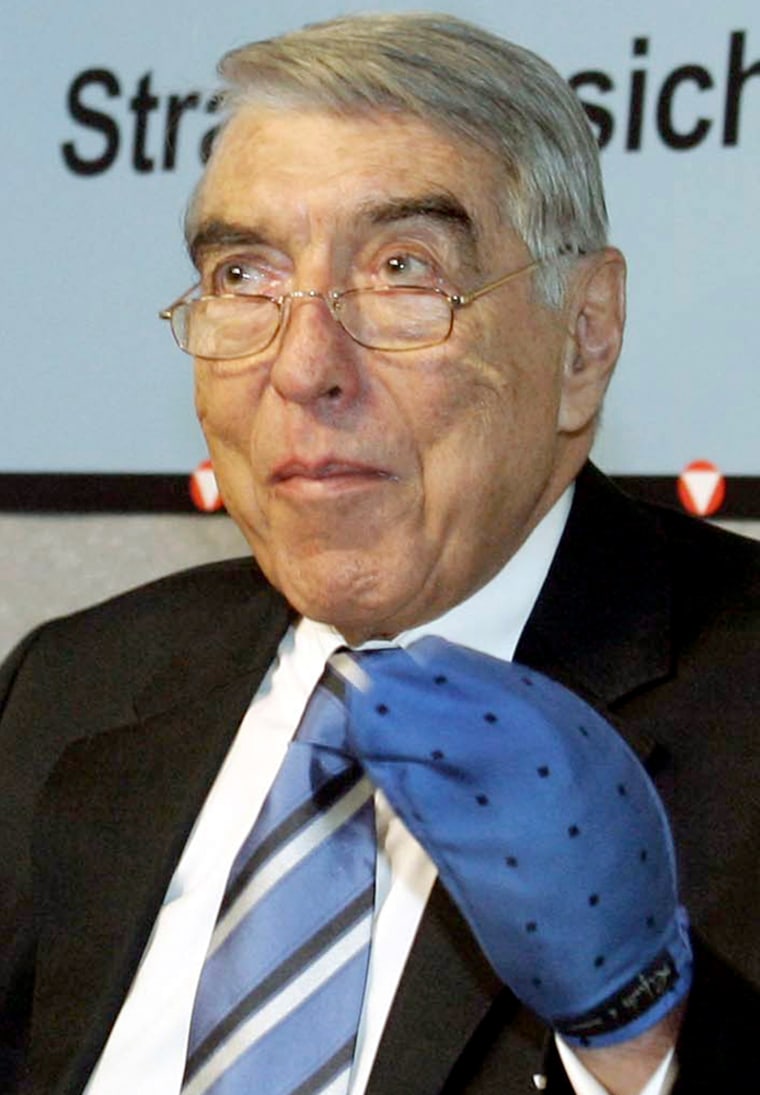Was he or wasn't he a spy?
Austria is awash in speculation that one of the country's most prominent politicians — the late Vienna mayor Helmut Zilk — was an informant for the Czechoslovak secret service in the 1960s while working as a journalist.
The respected news magazine Profil reported this week that Zilk provided the Czech intelligence agency, StB, with details about Austrian politics between December 1965 and June 1968.
In exchange for his information, Zilk allegedly was paid roughly euro30,000 ($40,600) and given a crystal chandelier, said the magazine, which published recently declassified Czech documents that included receipts purportedly signed by Zilk.
While not new — similar rumors surfaced 11 years ago — the allegations have caused a stir in Vienna, known to this day as a hotbed of espionage. Zilk always denied claims he collaborated with the Czechs.
Zilk, who died in October, has been front-page news all week. Lawmakers from across the political spectrum have weighed in, with some calling the debate tasteless. Others are urging the creation of a commission to clear up lingering suspicions about Zilk once and for all.
In Prague, Jiri Reichl, a spokesman for the government-funded Institute for the Study of Totalitarian Regimes, said an 800-page Zilk file was part of a publicly accessible archive it oversees that houses former security service files. It was not clear, however, whether the material cited by Profil was from the archive.
'Dirty journalism'
Zilk rejected the allegations in the late 1990s, telling Austrian radio he was "not aware of any wrongdoing" and that he would have been "crazy" to accept money from the former communist regime.
Vienna Mayor Michael Haeupl, also a Social Democrat, has dismissed the most recent allegations as "fundamentally ridiculous."
In a heated televised discussion this week, former actress Dagmar Koller, Zilk's third wife, accused Profil of "dirty journalism."
Interior Minister Maria Fekter, adding an additional element of intrigue, said an Austrian file on Zilk that could shed light on the matter was destroyed decades ago and tasked a senior ministry official with clearing up the circumstances surrounding the case.
Austrian broadcaster ORF reported Wednesday that it had located a microfilm copy of the file — possibly incomplete — in the State Archives.
According to ORF, the file cites an unnamed source as saying that Zilk knew his comments flowed into the Czechoslovak intelligence service but that Zilk wasn't an "agent."
At the time of his alleged undercover activities, Zilk was a journalist for Austrian state broadcaster ORF. He later worked as ombudsman for the mass-circulation daily Kronen Zeitung before going into politics in 1979. Outspoken and opinionated, he enjoyed broad popularity in his decade-long tenure as Vienna's mayor from 1984-94.
Declassified files
Zilk, a Social Democrat, got global media attention in 1993 when he lost part of his left hand while opening a letter bomb mailed to his home.
In early November, he was honored with a state funeral — broadcast live on national television — after he succumbed to an illness at age 81.
The latest allegations are based on recently opened Czech secret service files.
In 1998, Germany's Sueddeutsche Zeitung newspaper ran a similar story, prompting former Czech President Vaclav Havel to refuse to award Zilk a state honor. Havel, however, was one of the keynote speakers at Zilk's funeral and called Zilk both a personal friend and a friend of the Czech Republic.
According to local news reports, Havel also addressed the espionage rumors that surfaced in the 1990s and apologized to Zilk "in the name of the Czechs" for possibly hurting him.
Jiri Stastny, the author of a recent Zilk article published in the Czech newspaper Mlada Fronta Dnes, claims the Austrian also had contact with the CIA — taking the speculation even further.
"I'm convinced of that," Stastny told the Austria Press Agency.
